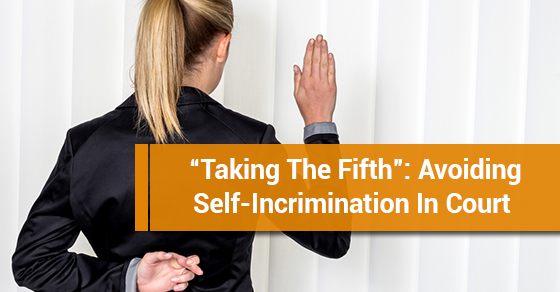“Taking the Fifth”: Avoiding Self-Incrimination in Court

The right against self-incrimination aims to protect against unreliable confessions and the abuse of power by the government. The importance of this right is highlighted by the fact that several different statutory provisions exist whose main purpose is to protect it. The right against self-incrimination, protected under the “life, liberty and security of the person” provision of the Charter of Rights and Freedoms (s.7), has led to the development of entire areas of law dealing with voluntariness of confessions, cautions and the right to counsel. The right to counsel itself has its own Charter section (s.10), and it is one of the primary Charter rights.
But what about a situation where a person being sued testifies in a lawsuit? Can his testimony be used against him in a later criminal trial? As with so many other legal issues, the answer is that “it depends”. For example, witnesses who testify in any proceeding have the right not to have any incriminating evidence they provide used against them in any other proceedings, except in a prosecution for perjury. This right is enshrined in section 13 of the Charter. In order to trigger section 13 protection, three conditions must be met: 1) the evidence has to be compelled (i.e. s/he is required to testify) 2) the evidence has to be incriminating at the time the Crown seeks to use it, and 3) the evidence has to be introduced at a subsequent proceeding.
However, in the case of R v Henry, the Supreme Court stated that an accused who chooses to testify at a trial cannot rely on section 13 of the Charter. In a situation where a witness is compelled to testify, he exposes himself to the risk of self-incrimination. Therefore, in exchange for full and frank testimony, the state offers protection against the later use of that evidence against the witness. On the other hand, where an accused freely testifies at a first and second trial, he is not protected under section 13, as there is no compulsion by the state. Therefore, if the accused during cross-examination provides testimony that is inconsistent with what he said in an earlier trial or other proceeding (such as a preliminary hearing), the judge or jury can use this evidence to make an inference of guilt.
The evidence must be incriminating in nature in order for section 13 to be engaged. Evidence is incriminating if it can be used to prove guilt or assist in proving one of the essential elements of an offence for which the accused is being tried. The issue of what is considered incriminating evidence arose in the case of R. v Nedelcu. Mr. Nedelcu was riding a motorcycle with his co-worker and lost control. Since the co-worker was not wearing a helmet, he suffered permanent brain damage as a result of the accident. Consequently, Mr. Nedelcu was charged with impaired driving and dangerous driving causing bodily harm. The victim’s family also commenced a civil law suit against Mr. Nedelcu.
During the examination for discovery for the civil action, Mr. Nedelcu claimed that he had no recollection of what had transpired while he was on the motorcycle. In contrast, during his criminal trial, Mr. Nedelcu provided a very detailed account of the course of events that led to the accident. For instance, he recited the route he took, the various speeds the motorcycle was at, when he applied the brakes, and the tactics he used to avoid injury. Furthermore, he attributed the cause of the accident to the victim, who allegedly shifted in the wrong direction on the motorcycle.
The Supreme Court in this case had to determine whether the Crown was permitted to cross-examine Mr. Nedelcu on the statements he made during the discovery in the civil action. Since Mr. Nedelcu’s statement about his lack of memory could not be used to prove his guilt at trial, he was not entitled to section 13 protection. Although the evidence had the effect of undermining the accused’s credibility, the Supreme Court affirmed that the right against self-incrimination is only directed towards evidence that is by its very nature incriminating. The risk that the Crown may take additional steps to convert regular evidence into incriminating evidence, for example by suggesting to the judge or jury that the prior evidence had been concocted, is not enough to cause the application of section 13. The mere rejection of an accused’s testimony, absent of other independent evidence, is not enough to convict him. Even though R v Nedelcu is a criminal case, it has important implications on civil matters. Individuals must be wary about what they say during discovery for a civil claim, as this evidence can be used to impeach them and show the judge or jury that they are unreliable and unworthy of belief in a criminal proceeding. It will be important for people who are facing both criminal and civil proceedings (most commonly in motor vehicle accident cases) to consult with their criminal and civil counsel to determine how testimony in one case might affect the other case.

